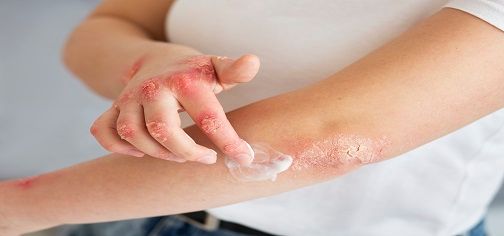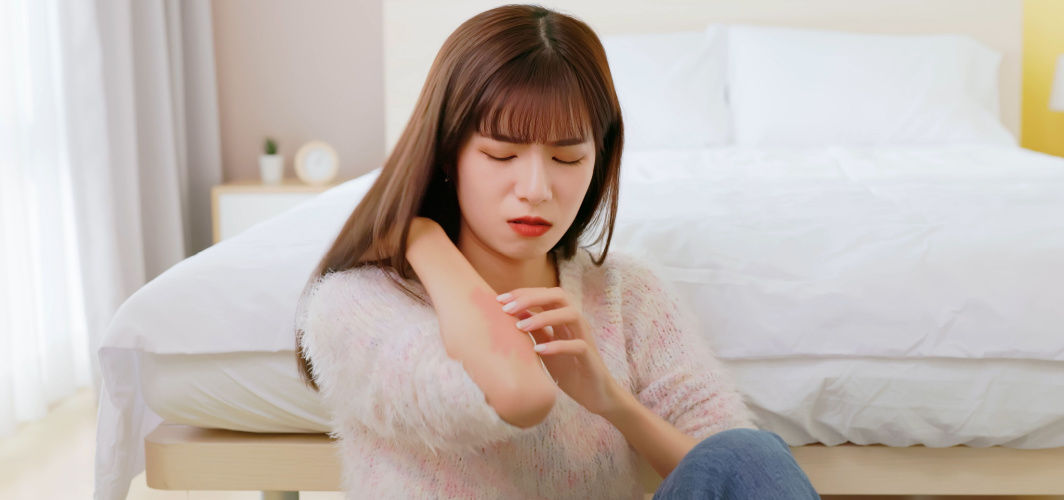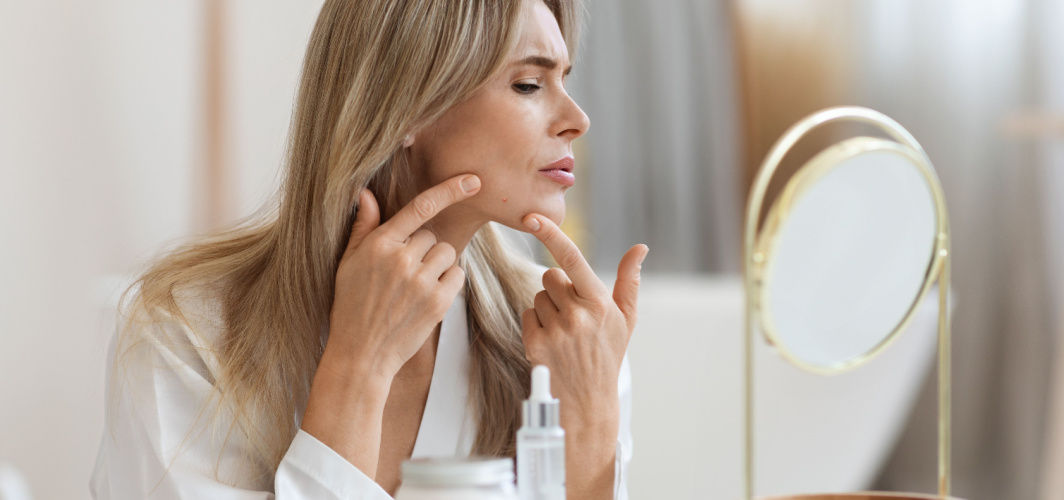Skin Care
Skin Rashes: Causes, Symptoms, Red Flags and Treatment
6 min read
By Apollo 24|7, Published on - 29 October 2022, Updated on - 07 August 2024
Share this article
0
0 like

We often face our skin turning red, swollen, or itchy after taking some medicines, eating certain food items, going out in the sun, or using cosmetics. Such skin conditions can lead to severe, life-threatening diseases if not treated on time. Read on to know the causes, symptoms, red flags, home remedies and treatment of skin rashes.
6 Causes, Symptoms, and Red flags of Skin Rashes
Skin rashes are caused predominantly by contact with allergic substances, ingestion of allergic materials and as a consequence of disease in the body. Some of the common causes of skin rash symptoms, red flags and home remedies include:
1. Contact Dermatitis
1.1 Causes
Contact dermatitis is an adverse skin reaction that occurs when the skin comes in contact with an allergic or irritating material. Examples include leather, rough textured clothes, cosmetics, soap, detergent, and poisonous plants like poison ivy, oak and sumac.
1.2. Symptoms
Red, itchy skin that may swell up consequently. There may also be blisters that swell and ooze. Symptoms may sometimes appear hours or days after initial contact with an allergen.
1.3. Home Remedies
- Cleaning the affected skin with mild soap and lukewarm water
- Using over the counter anti itching creams and lotions
- One can also apply a soothing petroleum jelly
1.4. Red Flags
Persistence and worsening of symptoms even after withdrawal of irritating materials calls for medical attention.
For skin allergy treatment, consult an expert dermatologist at Apollo 24/7.
2. Eczema
2.1. Causes
Eczema is an autoimmune skin reaction with no known cause. Researchers have hypothesized genetic predisposition as a possible cause of eczema.
2.2. Symptoms
- Dry, inflamed, itchy, red and flaky skin patches
- Skin sores
- Oozing skin blisters
- Scaly skin
2.3. Home Remedies
- Managing stress with exercise, yoga and meditation
- Listening to soothing music
- Cold compression
- Alternatively, a warm bath may also help reduce itching
- Green tea, oolong tea, essential oils, etc
2.4. Red Flags
Symptoms of asthma-like breathlessness, chest tightness and harsh breath sounds indicate worsening of eczema.
3. Diaper Rash
3.1. Causes
Commonly seen in toddlers and infants as a consequence of diapers that are too tight, work for a longer time, sweat around the edges of diapers, etc. It is a form of contact dermatitis.
3.2. Symptoms
Red and irritated skin with a cranky infant.
3.3. Home Remedies
Diaper care is of utmost importance. Change diapers at a fixed schedule, check for the size and material of diapers and maintain a healthy diet.
3.4. Red Flags
When a baby develops fever and oozing blisters, one should seek a dermatologist's opinion at the earliest.
4. Psoriasis
4.1. Causes
Psoriasis is an autoimmune condition where skin cells accumulate due to the body's immune system's over activity, forming a raised patch of scaly skin. There is no definite cause for this condition.
4.2. Symptoms
- Sore skin patches
- Scaly skin
- Inflamed red skin
- One may also experience painful joints with swelling
4.3. Home Remedies
Not all cases of Psoriasis can be managed with home remedies. A dermatologist will help you set a management protocol. A few measures one can take to prevent progression are:
- Maintaining a healthy weight through diet and optimal exercise
- Avoiding stress through meditation, yoga and soothing music
- Light therapy may help in some cases
4.4. Red Flags
Excessive swelling, painful skin patches and worsening of associated symptoms are definite red flags.
A dermatologist and a rheumatologist opinion is necessary for the management of Psoriasis. Consult with one now.
5. COVID-19 Rash
5.1. Causes
COVID-19 skin rash is a consequence of infection from the coronavirus.
5.2. Symptoms
- Skin itching
- Skin patches that are red and scaly
- Areas affected include the toes, fingers, chest and back.
5.3. Home Remedies
Since COVID-19 is new and is under research, one must refrain from home remedies for skin rashes from COVID-19 infection.
5.4. Red Flags
Persistence of skin rash beyond 8-10 days and sudden and rapid spread(hives) of rash all over the body.
6. Shingles
6.1. Causes
Shingles is an infective skin condition caused by the varicella-zoster virus and is also a consequence of a hyperactive immune system.
6.2. Symptoms
- Often begins with pain and swelling
- Red, itchy and inflamed skin patches
- A rash is seen on the chest, abdomen, neck or hands
- Associated symptoms like fever, chills, fatigue and muscle weakness
6.3. Home Remedies
- Cold compression to ease swelling
- A warm bath to reduce skin discomfort
- Use of calamine lotion to reduce skin itching
6.4. Red Flags
If symptoms persist beyond 10 days and the rash turns into blisters or bumps, one must visit a dermatologist for further management.
Skin Rashes Prevention
Skin rashes occur due to infections, allergic reactions, local irritants, or poisonous plants. Therefore, the prevention of skin rashes includes:
- It is necessary to take routine immunizations.
- Wash your hands and bathe regularly.
- Clothing or other grooming items should not be shared with others.
- Dermatologists suggest wearing light-colored clothes that cover most of the skin while going outdoors. Moreover, consult a dermatologist for tick repellents.
- Avoid eating or using allergic materials to prevent skin rashes.
- Do not consume unprescribed medicines.
- Stay away from irritants.
- Diapers should be changed frequently in case of diaper rash.
- Make sure the baby is not wet before using the new diaper.
- In the case of sensitivity to chemical products, use natural soaps and softeners because they have fewer dyes or added chemicals.
- In the case of reactions to cosmetics, try to replace your existing products with over-the-counter creams that are less irritant and fragrant.
- Skin rashes caused by toxic plants such as poison oak, poison sumac, or poison ivy are common when we are outdoors with such plants. Learn to identify poisonous plants and cover the body in such places.
To prevent skin rashes, you may need to change your soap, cosmetics, medicines, or eating habits. For the same, we suggest you consult with one of our best dermatologists near you.
Skin Rash Treatment
Treatment for skin rash will vary according to the cause of skin rash or allergic reactions.
- Infections: Dermatologists may use antibiotics and antifungal medicines to treat infections. However, viral infections need antiviral drugs in some cases, and for others, the viral infections go away naturally in a few days.
- Allergy: Allergy can sometimes be fatal and require immediate medical attention with medications like Epinephrine, Corticosteroids and antihistamines.
- Local irritants: For rashes from cosmetics, diapers, poisonous plants, and materials, dermatologists may prescribe oral steroids, steroid creams and ointments.
Don't Ignore A Skin Rash!
Skin rashes occur due to underlying conditions like allergies, infections, eating habits, drug reactions, or sun exposure. Skin rash home remedies are effective for mild and local skin rashes. However, one should consult a dermatologist if rashes spread rapidly and are accompanied by a fever.
Frequently Asked Questions About Skin Rashes
1. How long do skin rashes take to heal?
For mild rashes, home remedies for skin rashes will work within 2-3 weeks. However, it is best to consult dermatologists to treat skin rashes for severe rashes like bumps and blisters.
2. What foods should be avoided for skin rashes?
Avoid food items like peanuts, cow's milk, wheat, eggs, soy, and shellfish. They can worsen your symptoms of skin rashes.
3. What is a skin rash called medically?
Medically, a skin rash is called dermatitis, meaning inflammation of the skin.
4. Which is the best test to find out the cause of skin rashes?
Dermatologists may suggest a patch test to determine the most appropriate cause behind skin rashes.
5. What are the common causes of skin rashes?
The causes of skin rashes include infections, immune system disorders, heat, allergens, and/or medications.
Medically Reviewed by Dr. Dhanunjay Reddy B
Skin Care
Consult Top Dermatologists
View AllLeave Comment
Recommended for you

Skin Care
Pemphigus Vulgaris: Warning Signs, Symptoms, Causes, Diagnosis, & Treatments
Pemphigus Vulgaris: Learn about warning signs, symptoms, causes, diagnosis, and treatment options for this autoimmune skin disorder.

Skin Care
6 Ways To Manage Sweating During Summers
It can get difficult to manage sweating during the hot summer months. Fortunately, there’s a lot you can do to prevent your body from sweating too much. So, read on to learn about some effective strategies to help you sweat less this summer.

Skin Care
Hormonal Acne: Definition, Causes, Symptoms, Treatments & Prevention
Discover all about hormonal acne, from its definition and causes to symptoms, treatments, and prevention strategies. Your guide to clearer skin.
Subscribe
Sign up for our free Health Library Daily Newsletter
Get doctor-approved health tips, news, and more.
Recommended for you

Skin Care
Pemphigus Vulgaris: Warning Signs, Symptoms, Causes, Diagnosis, & Treatments
Pemphigus Vulgaris: Learn about warning signs, symptoms, causes, diagnosis, and treatment options for this autoimmune skin disorder.

Skin Care
6 Ways To Manage Sweating During Summers
It can get difficult to manage sweating during the hot summer months. Fortunately, there’s a lot you can do to prevent your body from sweating too much. So, read on to learn about some effective strategies to help you sweat less this summer.

Skin Care
Hormonal Acne: Definition, Causes, Symptoms, Treatments & Prevention
Discover all about hormonal acne, from its definition and causes to symptoms, treatments, and prevention strategies. Your guide to clearer skin.



